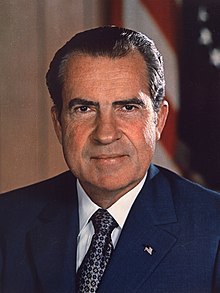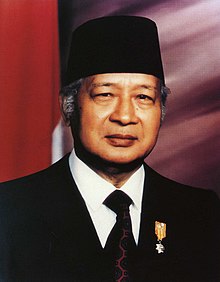Portal:1960s
The 1960s Portal
The 1960s became synonymous with the new, radical, and subversive events and trends of the period. In Africa the 1960s was a period of radical political change as 32 countries gained independence from their European colonial rulers. Some commentators have seen in this era a classical Jungian nightmare cycle, where a rigid culture, unable to contain the demands for greater individual freedom, broke free of the social constraints of the previous age through extreme deviation from the norm. Christopher Booker charts the rise, success, fall/nightmare and explosion in the London scene of the 1960s. However, this alone does not explain the mass nature of the phenomenon. Several nations such as the U.S., France, Germany and Britain turned to the left in the early and mid 1960s. In the United States, John F. Kennedy, a Keynesian and staunch anti-communist, pushed for social reforms. His assassination in 1963 was a stunning shock. Liberal reforms were finally passed under Lyndon B. Johnson including civil rights for African Americans and healthcare for the elderly and the poor. Despite his large-scale Great Society programs, Johnson was increasingly reviled by the New Left at home and abroad. The heavy-handed American role in the Vietnam War outraged student protestors across the globe, as they found peasant rebellion typified by Ho Chi Minh and Che Guevara more appealing. Italy formed its first left-of-center government in March 1962 with a coalition of Christian Democrats, Social Democrats, and moderate Republicans. Socialists joined the ruling block in December 1963. In Britain, the Labour Party gained power in 1964. In Brazil, João Goulart became president after Jânio Quadros resigned. This is a Featured article, which represents some of the best content on English Wikipedia..
The 1962 Tour de France was the 49th edition of the Tour de France, one of cycling's Grand Tours. The 4,274-kilometre (2,656 mi) race consisted of 22 stages, including two split stages, starting in Nancy on 24 June and finishing at the Parc des Princes in Paris on 15 July. There were four time trial stages and no rest days. After more than 30 years, the Tour was again contested by trade teams instead of national teams. Jacques Anquetil of the Saint-Raphaël–Helyett–Hutchinson team won the overall general classification, defending his title to win his third Tour de France. Jef Planckaert (Flandria–Faema–Clément) placed second, 4 min 59 s in arrears, and Raymond Poulidor (Mercier–BP–Hutchinson) was third, over ten minutes behind Anquetil. Anquetil's teammate Rudi Altig took the first general classification leader's yellow jersey after winning the first stage. He lost it the following day to André Darrigade of Gitane–Leroux–Dunlop–R. Geminiani, who won stage 2a, before regaining it after winning stage three. The lead was taken by Saint-Raphaël rider Albertus Geldermans after stage six. He held it for two stages, before Darrigade took it back for the next two. Flandria rider Willy Schroeders then led the race between the end of stage nine to the end of eleven, at which point Schroeders' teammate Rik Van Looy, a major pre-race favourite, abandoned the race with an injury. The following day, British rider Tom Simpson (Gitane–Leroux) became the first rider from outside mainland Europe in history to wear the yellow jersey. He lost it to Planckaert after stage thirteen's individual time trial to Superbagnères in the Pyrenees. He held the lead for seven stages, which included the Alps. Anquetil's victory in the individual time trial of stage twenty put him in the yellow jersey, which he held until the conclusion of the race. (Full article...)This is a Good article, an article that meets a core set of high editorial standards.
Madhouse on Castle Street is a British television play, broadcast by BBC Television on the evening of 13 January 1963, as part of the Sunday Night Play strand. It was written by Evan Jones and directed by Philip Saville. The production featured the young American folk music singer Bob Dylan, who soon became a major musical star. The play was made with electronic video cameras, although recorded onto film rather than tape. The only known copy of the play was junked in 1968, as was the standard practice of the time, despite the fact that Dylan and lead actor David Warner were by then famous. Although extensive searches have been made by the BBC, only partial audio recordings of four songs sung by Dylan survive. (Full article...)Selected picture - Attempting to block racial integration at the University of Alabama, Governor George Wallace (left) stands defiantly at the door on June 11, 1963, in an incident known as the Stand in the Schoolhouse Door. Wallace moved aside after being ordered to do so by President John F. Kennedy; years later, he became a born-again Christian and recanted his segregationist views.
Did you know -
Related portalsThis is a Featured article, which represents some of the best content on English Wikipedia..
Richard Milhous Nixon (January 9, 1913 – April 22, 1994) was the 37th president of the United States, serving from 1969 to 1974. A member of the Republican Party, he previously served as a representative and senator from California and as the 36th vice president from 1953 to 1961 under President Dwight D. Eisenhower. His presidency saw the reduction of U.S. involvement in the Vietnam War, détente with the Soviet Union and China, the Apollo 11 Moon landing, and the establishment of the Environmental Protection Agency and Occupational Safety and Health Administration. Nixon's second term ended early when he became the only U.S. president to resign from office, as a result of the Watergate scandal. Nixon was born into a poor family of Quakers in a small town in Southern California. He graduated from Duke Law School in 1937, practiced law in California, and then moved with his wife Pat to Washington, D.C., in 1942 to work for the federal government. After serving active duty in the Naval Reserve during World War II, he was elected to the House of Representatives in 1946. His work on the Alger Hiss case established his reputation as a leading anti-communist, which elevated him to national prominence. In 1950, he was elected to the Senate. Nixon was the running mate of Eisenhower, the Republican Party's presidential nominee in the 1952 election, and served for eight years as vice president. He narrowly lost the 1960 presidential election to the Democratic Party nominee John F. Kennedy; after his loss in the 1962 race for governor of California, he announced his retirement from political life. However, in 1968, he made another run for the presidency and defeated the Democratic incumbent vice president Hubert Humphrey. (Full article...)This is a Good article, an article that meets a core set of high editorial standards.
Suharto (/suːˈhɑːrtoʊ/ soo-HAR-toh, Indonesian: [suˈharto] ⓘ; 8 June 1921 – 27 January 2008) was an Indonesian military officer and politician, who served as the second and the longest serving President of Indonesia. Widely regarded as a military dictator by international observers, Suharto led Indonesia as an authoritarian regime from the fall of his predecessor Sukarno in 1967 until his resignation in 1998 following nationwide unrest. His 31-year dictatorship is considered one of the most brutal and corrupt of the 20th century, as he was central to the perpetration of mass killings against alleged communists, ethnic Chinese, irreligious people and trade unionists. Suharto was born in the small village of Kemusuk, in the Godean area near the city of Yogyakarta, during the Dutch colonial era. He grew up in humble circumstances. His Javanese Muslim parents divorced not long after his birth, and he lived with foster parents for much of his childhood. During the Japanese occupation era, Suharto served in the Japanese-organized Indonesian security forces. During Indonesia's independence struggle, he joined the newly formed Indonesian Army. There, Suharto rose to the rank of major general some time after full Indonesian independence was achieved. (Full article...)Selected article -The 1964 Brazilian coup d'état (Portuguese: Golpe de estado no Brasil em 1964) was the overthrow of Brazilian president João Goulart by a military coup from March 31 to April 1, 1964, ending the Fourth Brazilian Republic (1946–1964) and initiating the Brazilian military dictatorship (1964–1985). The coup took the form of a military rebellion, the declaration of vacancy in the presidency by the National Congress on April 2, the formation of a military junta (the Supreme Command of the Revolution) and the exile of the president on April 4. In his place, Ranieri Mazzilli, the president of the Chamber of Deputies, took over until the election by Congress of general Humberto de Alencar Castelo Branco, one of the main leaders of the coup. Democratically elected vice president in 1960, Jango, as Goulart was known, assumed power after the resignation of president Jânio Quadros, in 1961, and the Legality Campaign, which defeated an attempted military coup to prevent his inauguration. During his government, the economic crisis and social conflicts deepened. Social movements political, labor, peasant, student, and low-ranking military milieus advocated for a set of "base reforms" proposed by the president. He met growing opposition among the elite, the urban middle class, a large portion of the officer corps, the Catholic Church and the press, who accused him of threatening the legal order and of colluding with communism, social chaos and the breakdown of military hierarchy. Throughout his tenure, Goulart had come under numerous efforts to pressure and destabilize his government and plots to overthrow him. Brazil's relations with the United States deteriorated and the American government allied with opposition forces and their efforts, supporting the coup. Goulart lost the support of the center, failed to approve the base reforms in Congress and in the final stage of his government relied on pressure from reformist movements to overcome the resistance of the Legislature, leading to the height of the political crisis in March 1964. (Full article...)More Did you know (auto generated)
TopicsCategoriesWikiProjects
Associated WikimediaThe following Wikimedia Foundation sister projects provide more on this subject:
Discover Wikipedia using portals |






























